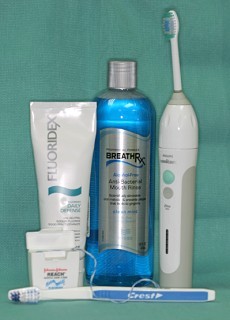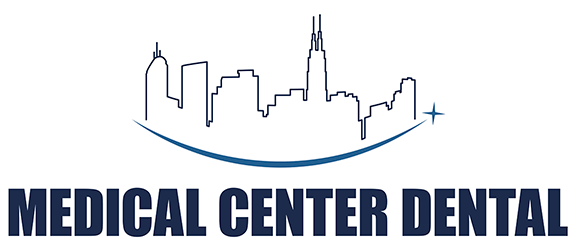RECOMMENDED HYGIENE SUPPLIES

For those with little restorative work – a Crest (soft, medium head) toothbrush is great. Any floss is better than none; however, we feel the unwaxed or woven floss grabs more debris – making it more effective. But, most patients prefer the ease of using a waxed floss, such as Glide, for easy access between tight teeth.
TOOTHBRUSH
To maintain a healthy smile, you need to brush at least twice a day. More importantly, thoroughly clean your mouth immediately before going to bed. This prevents harmful bacteria from settling on your teeth overnight. We are more prone to decay and infection overnight b/c our salivary glands are not as active when we are not talking/chewing/or swallowing as often. Never eat or drink something between brushing and retiring for bed. Otherwise, this food or drink will remain on you teeth overnight and can have destructive effects.
When you brush your “teeth”. think more about brushing the “gums”. Your gums are somewhat of a shelf for bacteria and plaque to rest on. Brushing at the gumline removes more debris overall and stimulates healthy blood flow and circulation to the tissue. Move your toothbrush in a massaging or vibratory motion. Better yet, try using an electric toothbrush to create more stimulation and remove more plaque and stain.
Here are some toothbrushes we recommend:
Electric toothbrushes are always preferred!
(ex: Sonicare, Oral-B, Braun, Colgate Actibrush, Rotadent)
Manual toothbrushes need to have a soft, small head (ex: Crest). Even a smaller toothbrush is good for those with smaller mouths (ex: youth or child size brush depending on patient’s mouth)
FLOSS
Brushing is important, but the bristles don’t reach between the teeth; therefore, it is important to floss on a daily basis to prevent decay between the teeth and/or gum infection. There are many different types of floss listed below. If you have difficulty flossing, let us know and we can help you find the proper floss holder for easier access.
Floss we recommend:
Glide, Johnson & Johnson Dentotape, POH unwaxed floss, Johnson & Johnson Reach Gentle gum care is a fluoride woven floss, Oral-B superfloss, or more preferable = Thorton’s periodontal floss and bridge & implant floss. these include a stiff end for threading under bridges or tight contacts and a foamy portion of floss to loosen plaque/food, floss threaders along w/ any type of floss for orthodontics or bridges.
MOUTH RINSE
Mouth rinses can be added to your daily routine for additional bacterial removal and a fresh taste/breath. They should be used at full strength for about 20-30 seconds.
Non-alcoholic rinses (ex: Breath Rx) are preferred for all patients, especially those with porcelain restorations and/or dry mouth. It has a refreshing taste and kills the germs without the alcohol. However, some patients still prefer to use alcohol rinses such as Listerine and Scope. These rinses are okay for those who do not experience dry mouth. Due to the alcohol content, these types of rinses are contraindicated for patients that suffer from dry mouth associated with medications or health problems such as cancer, Sjogren’s syndrome, Lupus, etc. Alcohol rinses can also dull porcelain crowns, veneers, or onlays.
Breath Rx has a complete line of products for bad breath that are sold through our dental office. They have a great toothpaste, tongue spray, mints, gum, and tongue gel and scrapers in additon to their rinse. These are wonderful tools that help control bad breath and keep your mouth feeling fresh.
TOOTHPASTE
Particular toothpaste brands are more of a personal preference. Some choose on taste, consistency, or other additives. There are numerous toothpastes on the market from whitening to tartar control to plain gel toothpaste. Plain gel or cavity protection toothpaste (ex: Crest) is good for all patients. However, some prefer to have a toothpaste with whitening to help lessen the amount of stain buildup. Tartar control is also okay but can irritate some patient’s gums. Still others like to use sensitivity toothpaste which is perfectly safe for all patients.
It is not necessary to use a large amount of toothpaste when brushing because the mechanical action is more important than the amount of paste. In summary, long as you use a fluoridated toothpaste that meets your personal standards, you will not jeopardize you oral health.
FLUORIDE
More over the brand or flavor of a toothpaste is the content of fluoride. Fluoride helps to prevent decay for patients who are more prone to cavities. Furthermore, fluoride helps decrease sensitivity on exposed root surfaces or recently bleached teeth. Over the counter pastes can only contain a certain level of fluoride. For this reason, we provide our patients with a prescription strength fluoridated toothpaste. Here are some fluorides we sell in our office or write prescriptions for:
Prevident fluoride gel is safe for all dental work and great at preventing sensitivity and decay when used consistently.
Fluoridex is a fluoride gel toothpaste (all in one) and is equally a great product. Gingimed is a fluoride rinse that can be swished or brushed on you teeth.
OTHER AIDS
In addition to brushing, flossing, rinsing, and fluoridating your teeth and gums, there are other aids we recommend and provide to our patients for harder to reach areas. Rubber tip for gum stimulation, proxy brush ( ie. Christmas tree brush) for plaque removal in larger spaces or under implants and bridges, rotapoints (plastic picks) and/or toothpicks for between the teeth, waterpicks, or whatever else the individual prefers to use to remove plaque and debris.

